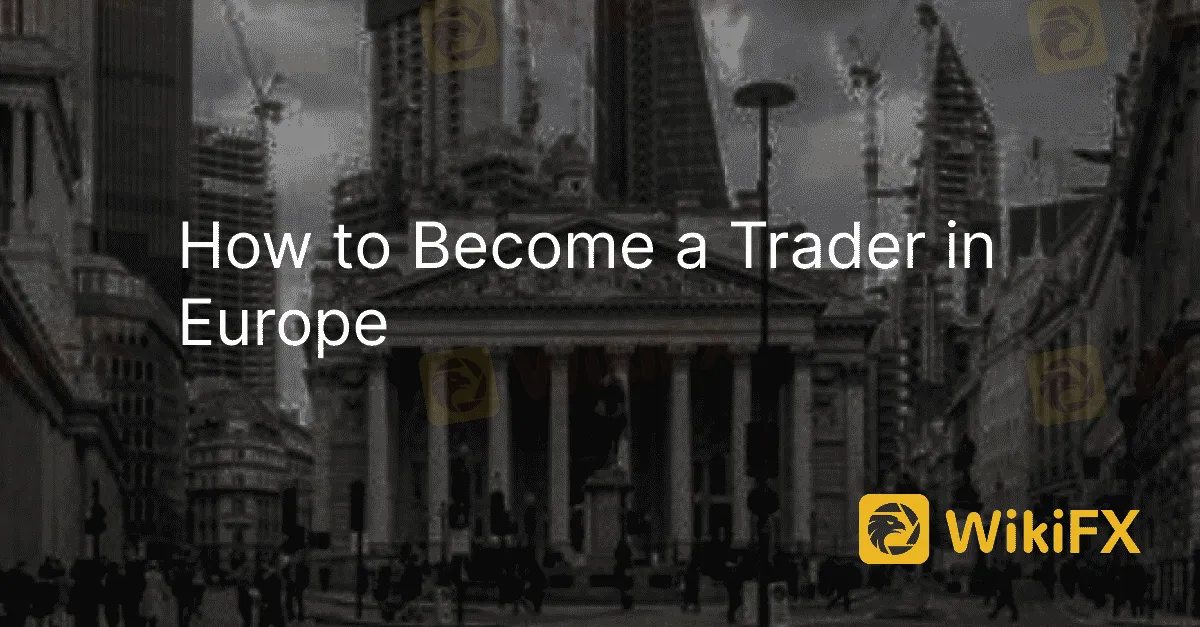简体中文
繁體中文
English
Pусский
日本語
ภาษาไทย
Tiếng Việt
Bahasa Indonesia
Español
हिन्दी
Filippiiniläinen
Français
Deutsch
Português
Türkçe
한국어
العربية
How to Become a Trader in Europe
Abstract:Becoming a trader in Europe offers an exciting opportunity to participate in the dynamic world of financial markets. Whether you aspire to trade stocks, commodities, or forex, here are some steps to guide you on your journey to becoming a trader in Europe.

Becoming a trader in Europe offers an exciting opportunity to participate in the dynamic world of financial markets. Whether you aspire to trade stocks, commodities, or forex, here are some steps to guide you on your journey to becoming a trader in Europe.
Educate Yourself: Start by gaining a solid understanding of financial markets and trading concepts. Familiarize yourself with basic terminology, technical and fundamental analysis, risk management, and trading psychology. Online resources, courses, and educational platforms like WikiFX can provide valuable insights.
Choose Your Market: Decide which financial market you want to trade. Europe offers a diverse range of markets, including stocks, commodities, and forex. Consider your interests, risk tolerance, and the time you can dedicate to trading.
Select a Trading Style: Determine your preferred trading style. Are you more inclined towards day trading, swing trading, or long-term investing? Each style requires different skills and strategies. Experiment with different approaches to find the one that suits you best.
Find a Broker: Research and choose a reputable broker that aligns with your trading needs. Look for brokers regulated by reputable authorities such as the FCA or CySEC. Platforms like WikiFX can help you find reliable brokers in Europe.
Develop a Trading Plan: Create a trading plan that outlines your goals, risk tolerance, entry/exit strategies, and money management rules. A well-defined plan helps you stay disciplined and focused amidst market fluctuations.
Practice with Demo Accounts: Before trading with real money, practice using demo accounts offered by brokers. This allows you to test your strategies and gain confidence without risking your capital.
Start Small: Begin with a small trading capital and gradually increase your exposure as you gain experience and confidence. Remember that trading involves risks, and it is crucial to manage your capital wisely.
Learn from Mistakes: Expect to make mistakes along the way. Treat each trade as a learning opportunity and analyze your successes and failures. Continuous learning and adaptation are key to improving as a trader.
Stay Informed: Keep yourself updated with market news, economic indicators, and geopolitical events that can impact the markets. Platforms like WikiFX provide reliable news and analysis to help you make informed trading decisions.
Manage Emotions: Trading can be emotionally challenging. Learn to control your emotions and avoid impulsive decisions. Embrace discipline and stick to your trading plan.
Remember, becoming a successful trader takes time, dedication, and continuous learning. Utilize the resources available, like WikiFX, to enhance your trading journey in Europe.

Disclaimer:
The views in this article only represent the author's personal views, and do not constitute investment advice on this platform. This platform does not guarantee the accuracy, completeness and timeliness of the information in the article, and will not be liable for any loss caused by the use of or reliance on the information in the article.
Read more

Unlocking the Power of Algo Trading: Benefits and Limitation
Algorithmic trading merges speed, data, and automation—but can it outsmart human intuition and market chaos? Explore its power and pitfalls.

Do This ONE Thing to Transform Your Trading Performance Forever
The story is all too familiar. You start trading with high hopes, make some quick profits, and feel like you've finally cracked the code. But then, just as fast as your gains came, they disappear. Your account balance dwindles, and soon you’re left wondering what went wrong. Worse still, fear and confusion creep in, making every new trade a stressful gamble rather than a calculated decision. If this cycle sounds familiar, you’re not alone.

This FREE App Is Helping Millions Avoid Financial Scams
Fraudulent brokers, Ponzi schemes, and deceptive trading platforms are on the rise, making it increasingly difficult to distinguish between legitimate and illicit financial services. Fortunately, there’s a powerful, free tool designed to help users identify and avoid scams before it’s too late—WikiFX.

Forex Explained in 60 Seconds: How It Works & Who Profits
Before diving into the forex market, it’s crucial to understand its mechanics, risks, and profit potential. Without a clear grasp of how forex operates, you risk losing money instead of making it. Here’s a concise breakdown to help you navigate this dynamic financial market.
WikiFX Broker
Latest News
How Crypto Trading Transforms FX and CFD Brokerage Industry
UK would not hesitate to retaliate against US tariffs - No 10 sources
FCA Warns Against 10 Unlicensed or Clone Firms
CySEC Warns Against 14 Unlicensed Investment Websites
Top Currency Pairs to Watch for Profit This Week - March 31, 2025
Will natural disasters have an impact on the forex market?
Philippines Deports 29 Indonesians Linked to Online Scam Syndicate in Manila
Navigating the Intersection of Forex Markets, AI Technology, and Fintech
Exposed: Deceptive World of Fake Trading Gurus – Don’t Get Fooled!
AI-Powered Strategies to Improve Profits in Forex Trading
Currency Calculator







